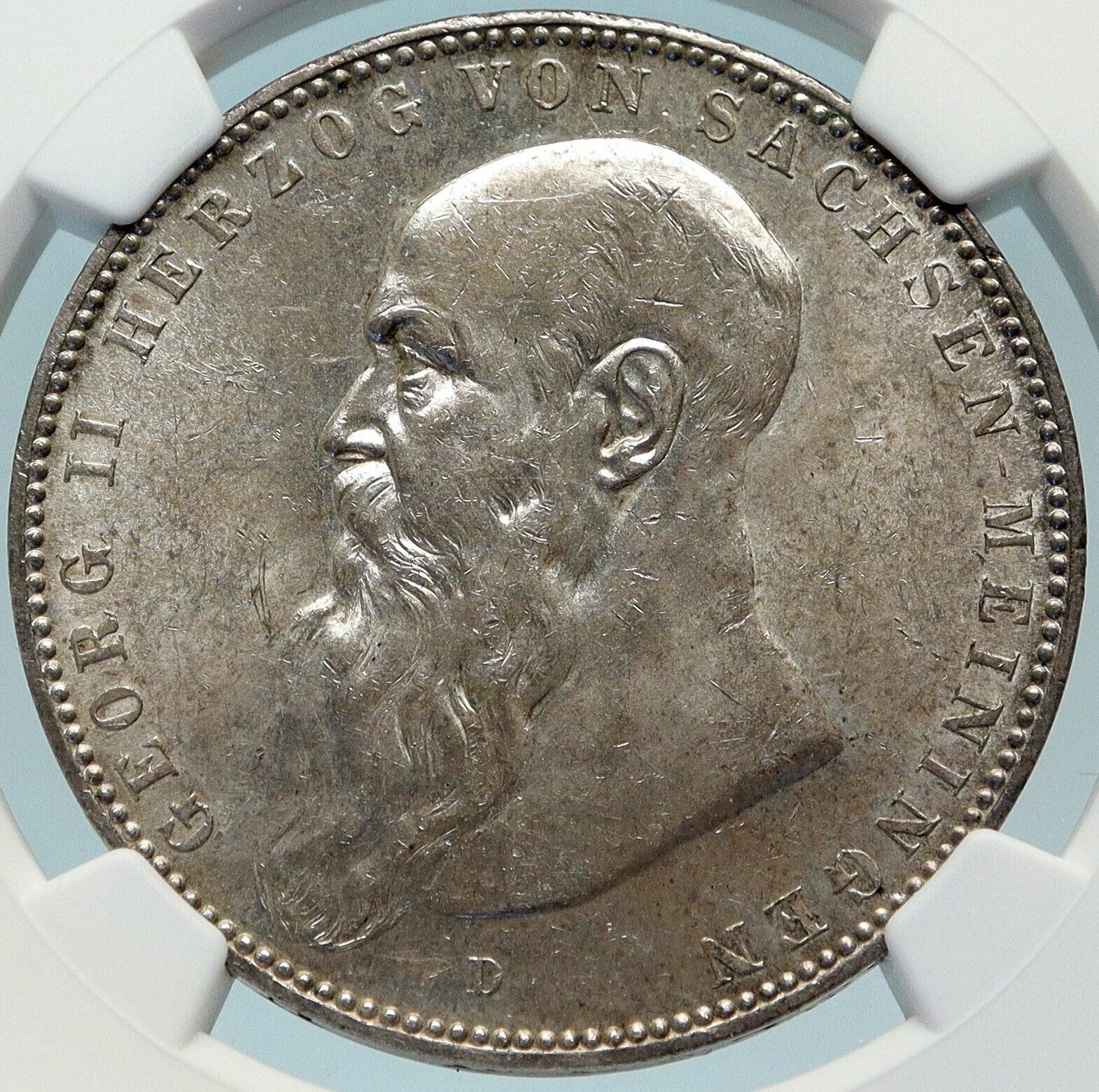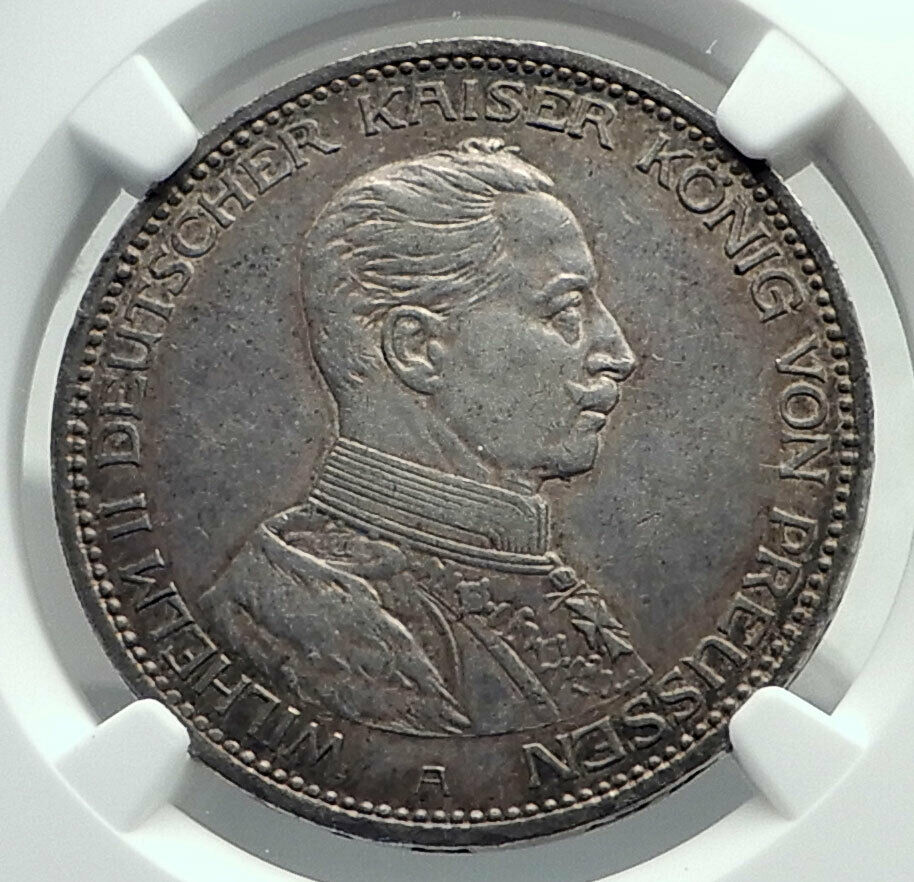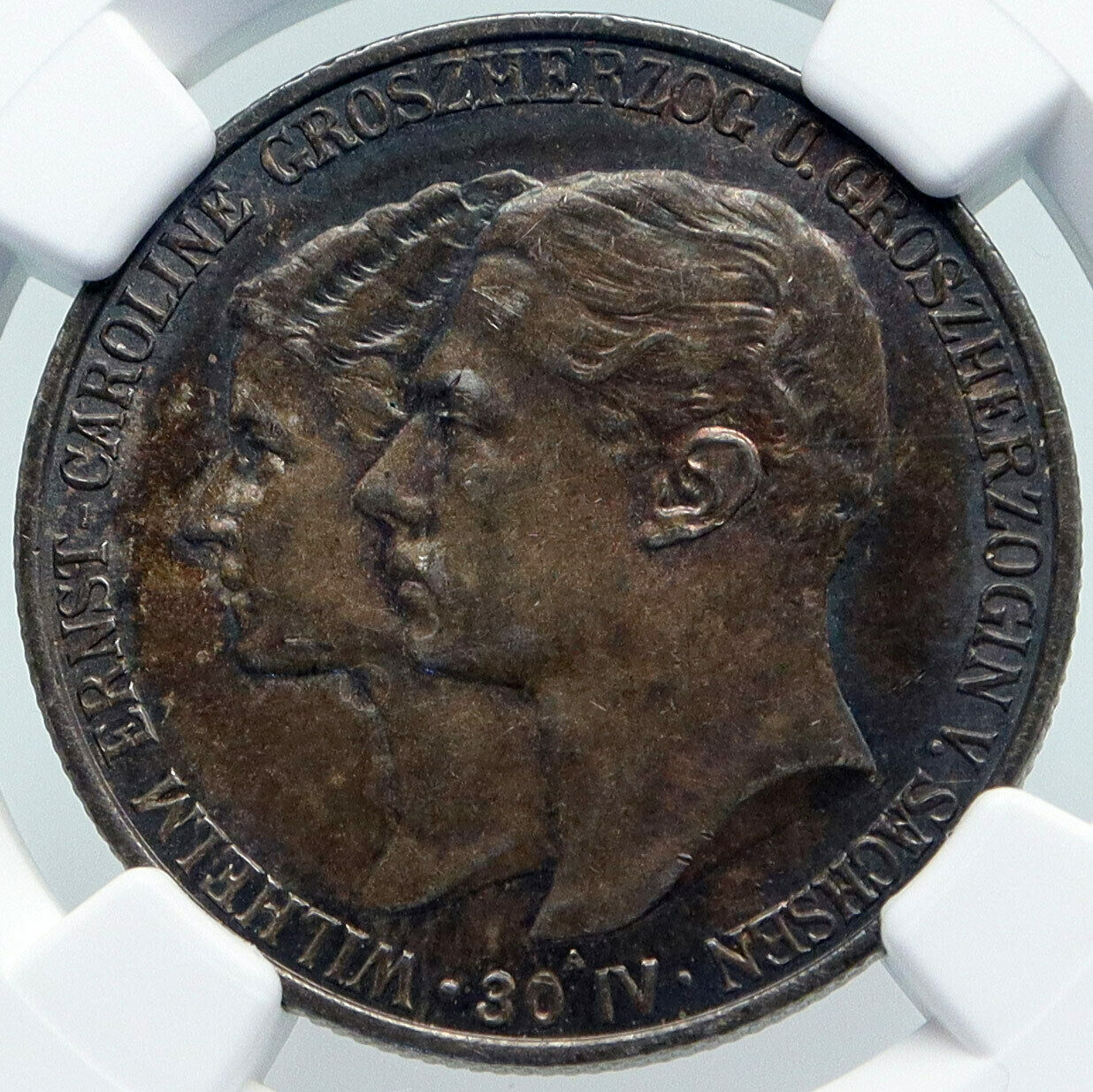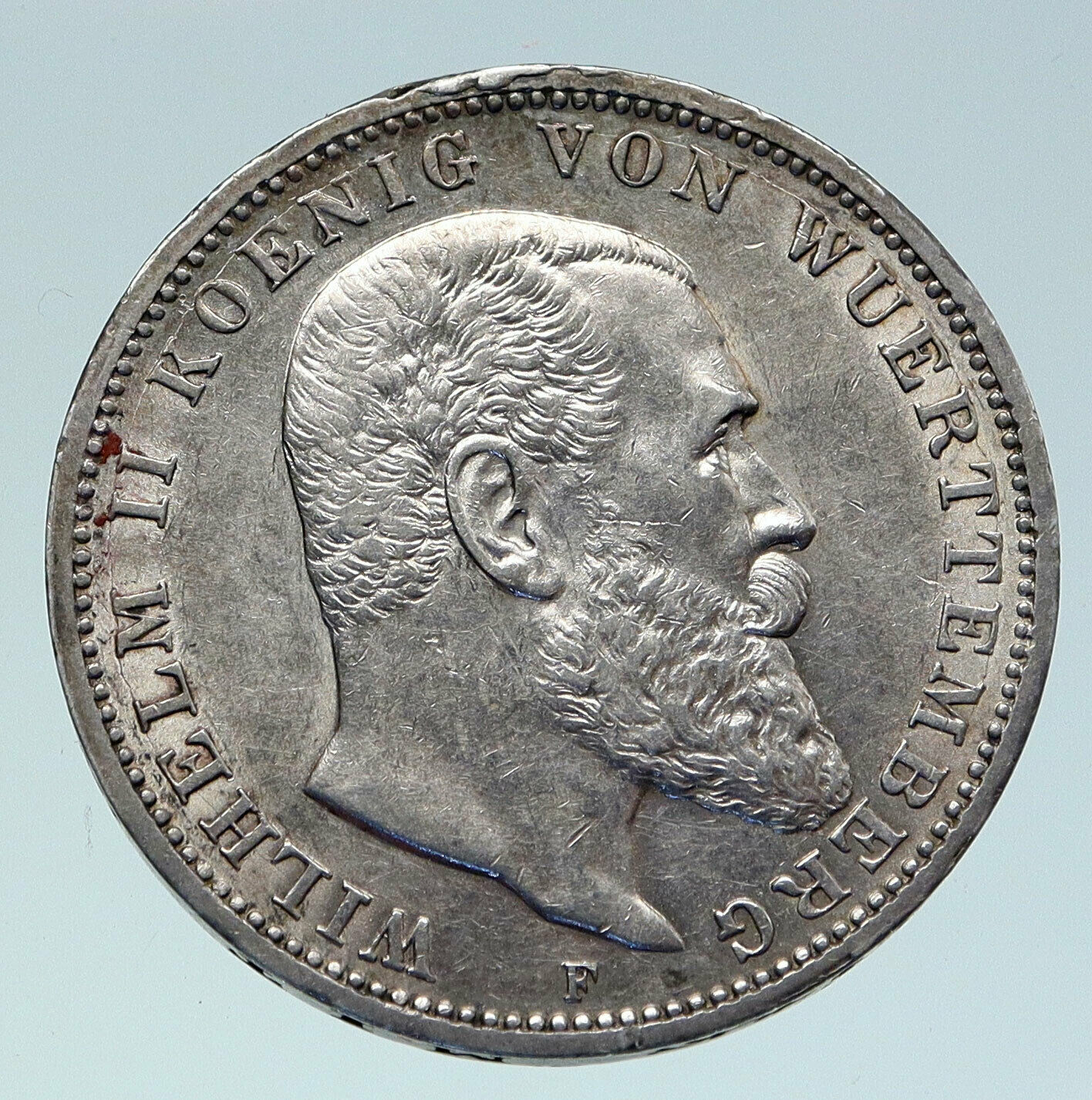|
Germany – German States – Kingdom of Prussia
100th Anniversary of Prussia entering the war against Napoleon
War of the Sixth Coalition Commemorative
1913 Silver 3 Mark 33mm (16.68 grams) 0.900 Silver (0.4823 oz. ASW)
Reference: KM# 534
DER KÖNIG RIEF UND ALLE ALLE KAMEN· “The King Called and All Came”, King Frederick William III of Prussia surrounded by people cheering him.
MIT GOTT·FÜR KÖNIG UND VATERLAND 17-3-1813
DREI REICH * DREI MARK *, Eagle in flight holding open-mouthed serpent in left claw.
You are bidding on the exact item pictured, provided with a Certificate of Authenticity and Lifetime Guarantee of Authenticity.
 Frederick William III (German: Friedrich Wilhelm III) (3 August 1770 – 7 June 1840) was king of Prussia from 1797 to 1840. He ruled Prussia during the difficult times of the Napoleonic wars and the end of the old German Empire. Steering a careful course between France and her enemies, after a major military defeat in 1806, he eventually and reluctantly joined the coalition against Napoleon in the Befreiungskriege. Following Napoleon’s defeat he was King of Prussia during the Congress of Vienna which assembled to settle the political questions arising from the new, post-Napoleonic order in Europe. Frederick William III (German: Friedrich Wilhelm III) (3 August 1770 – 7 June 1840) was king of Prussia from 1797 to 1840. He ruled Prussia during the difficult times of the Napoleonic wars and the end of the old German Empire. Steering a careful course between France and her enemies, after a major military defeat in 1806, he eventually and reluctantly joined the coalition against Napoleon in the Befreiungskriege. Following Napoleon’s defeat he was King of Prussia during the Congress of Vienna which assembled to settle the political questions arising from the new, post-Napoleonic order in Europe.
In the War of the Sixth Coalition (March 1813 – May 1814), sometimes known in Germany as the War of Liberation, a coalition of Austria, Prussia, Russia, the United Kingdom, Portugal, Sweden, Spain and a number of German states finally defeated France and drove Napoleon into exile on Elba. After the disastrous French invasion of Russia of 1812, the continental powers joined Russia, the United Kingdom, Portugal and the rebels in Spain who were already at war with France.
The War of the Sixth Coalition saw major battles at Lützen, Bautzen, and Dresden. The even larger Battle of Leipzig (also known as the Battle of Nations) was the largest battle in European history before World War I. Ultimately, Napoleon’s earlier setbacks in Russia and Germany proved to be the seeds of his undoing. With their armies reorganized, the allies drove Napoleon out of Germany in 1813 and invaded France in 1814. The Allies defeated the remaining French armies, occupied Paris, and forced Napoleon to abdicate and go into exile. The French monarchy was revived by the allies, who handed rule to the heir of the House of Bourbon in the Bourbon Restoration.
This was not, however, the end of the Napoleonic Wars. Napoleon subsequently escaped from his captivity and returned to power in France, sparking the War of the Seventh Coalition in 1815 (also known as the “Hundred Days”).
 Germany, officially the Federal Republic of Germany, officially the Federal Republic of  Germany is a federal parliamentary republic in western-central Europe. It includes 16 constituent states and covers an area of 357,021 square kilometres (137,847 sq mi) with a largely temperate seasonal climate. Its capital and largest city is Berlin. With 81 million inhabitants, Germany is the most populous member state in the European Union. After the United States, it is the second most popular migration destination in the world. Germany is a federal parliamentary republic in western-central Europe. It includes 16 constituent states and covers an area of 357,021 square kilometres (137,847 sq mi) with a largely temperate seasonal climate. Its capital and largest city is Berlin. With 81 million inhabitants, Germany is the most populous member state in the European Union. After the United States, it is the second most popular migration destination in the world.
Various Germanic tribes have occupied northern Germany since classical antiquity. A region named Germania was documented before 100 CE. During the Migration Period the Germanic tribes expanded southward. Beginning in the 10th century, German territories formed a central part of the Holy Roman Empire. During the 16th century, northern German regions became the centre of the Protestant Reformation.
The rise of Pan-Germanism inside the German Confederation resulted in the unification of most of the German states in 1871 into the Prussian-dominated German Empire. After World War I and the German Revolution of 1918-1919, the Empire was replaced by the parliamentary Weimar Republic. The establishment of the Third Reich in 1933 led to World War II and the Holocaust. After 1945, Germany split into two states, East Germany and West Germany. In 1990, the country was reunified.
 In the 21st century, Germany is a great power and has the world’s fourth-largest economy by nominal GDP, as well as the fifth-largest by PPP. As a global leader in several industrial and technological sectors, it is both the world’s third-largest exporter and importer of goods. Germany is a developed country with a very high standard of living sustained by a skilled and productive society. It upholds a social security and universal health care system, environmental protection and a tuition free university education. In the 21st century, Germany is a great power and has the world’s fourth-largest economy by nominal GDP, as well as the fifth-largest by PPP. As a global leader in several industrial and technological sectors, it is both the world’s third-largest exporter and importer of goods. Germany is a developed country with a very high standard of living sustained by a skilled and productive society. It upholds a social security and universal health care system, environmental protection and a tuition free university education.
Germany was a founding member of the European Union in 1993. It is part of the Schengen Area, and became a co-founder of the Eurozone in 1999. Germany is a member of the United Nations, NATO, the G8, the G20, and the OECD. The national military expenditure is the 9th highest in the world. Known for its rich cultural history, Germany has been continuously the home of influential artists, philosophers, musicians, sportsmen, entrepreneurs, scientists and inventors.
|





 Frederick William III (German: Friedrich Wilhelm III) (3 August 1770 – 7 June 1840) was king of Prussia from 1797 to 1840. He ruled Prussia during the difficult times of the Napoleonic wars and the end of the old German Empire. Steering a careful course between France and her enemies, after a major military defeat in 1806, he eventually and reluctantly joined the coalition against Napoleon in the Befreiungskriege. Following Napoleon’s defeat he was King of Prussia during the Congress of Vienna which assembled to settle the political questions arising from the new, post-Napoleonic order in Europe.
Frederick William III (German: Friedrich Wilhelm III) (3 August 1770 – 7 June 1840) was king of Prussia from 1797 to 1840. He ruled Prussia during the difficult times of the Napoleonic wars and the end of the old German Empire. Steering a careful course between France and her enemies, after a major military defeat in 1806, he eventually and reluctantly joined the coalition against Napoleon in the Befreiungskriege. Following Napoleon’s defeat he was King of Prussia during the Congress of Vienna which assembled to settle the political questions arising from the new, post-Napoleonic order in Europe. Germany, officially the Federal Republic of
Germany, officially the Federal Republic of  Germany is a federal parliamentary republic in western-central Europe. It includes 16 constituent states and covers an area of 357,021 square kilometres (137,847 sq mi) with a largely temperate seasonal climate. Its capital and largest city is Berlin. With 81 million inhabitants, Germany is the most populous member state in the European Union. After the United States, it is the second most popular migration destination in the world.
Germany is a federal parliamentary republic in western-central Europe. It includes 16 constituent states and covers an area of 357,021 square kilometres (137,847 sq mi) with a largely temperate seasonal climate. Its capital and largest city is Berlin. With 81 million inhabitants, Germany is the most populous member state in the European Union. After the United States, it is the second most popular migration destination in the world. In the 21st century, Germany is a great power and has the world’s fourth-largest economy by nominal GDP, as well as the fifth-largest by PPP. As a global leader in several industrial and technological sectors, it is both the world’s third-largest exporter and importer of goods. Germany is a developed country with a very high standard of living sustained by a skilled and productive society. It upholds a social security and universal health care system, environmental protection and a tuition free university education.
In the 21st century, Germany is a great power and has the world’s fourth-largest economy by nominal GDP, as well as the fifth-largest by PPP. As a global leader in several industrial and technological sectors, it is both the world’s third-largest exporter and importer of goods. Germany is a developed country with a very high standard of living sustained by a skilled and productive society. It upholds a social security and universal health care system, environmental protection and a tuition free university education.




